- Bernard Preston homepage
- What is a Cyan Zone?
- Blue Zone longevity
Blue zone longevity
Blue zone longevity is well-researched in five areas of the world. Could you create a similar environment where you live? Then you might expect to continue to a ripe old age with all your marbles and joints intact.
Blue zone people are gardeners and most of their food comes from plants; in particular legumes, dark-green leafy vegetables and whole grains. But they are not vegetarians. They get plenty of moderate exercise.
Close local family-ties and, in general, a connectedness to the community are important to these folk.
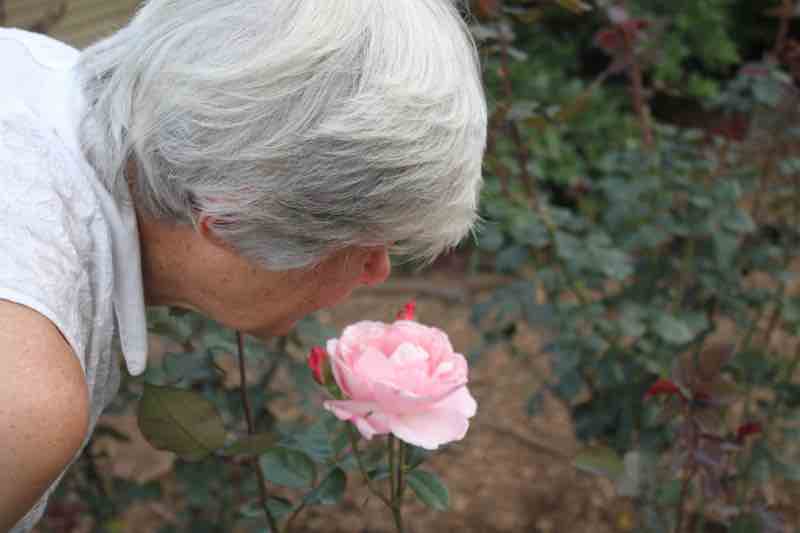
This page was updated on 9rd June, 2023 in light of the pandemic that has killed an estimated 20 million people; and its influence on blue zone longevity.
A group of researchers have identified five-areas in the world that they named the Blue Zones, where folk regularly live to strong and vibrant old age. What do these people have in common and how could you create that environment in your community?
On average worldwide one person in 10,000 lives to a hundred years old; but in the five Blue Zones ten-times as many centenarians are to be found.
Interestingly gardening is one of the features that typifies these folk in remote places like Ikaria, Sardinia and Okinawa. They love their food; the Italians for example would be turning their green herbs into homemade gremolata for enjoyment all year round. The Greeks love making pesto using olive oil; and the Japanese enjoy sweet potato dishes.
Gardeners they found have regular, moderate physical activity; much of their food comes from the plants they grow and they eat plenty of legumes.
In all five-areas they grow and eat broad beans.
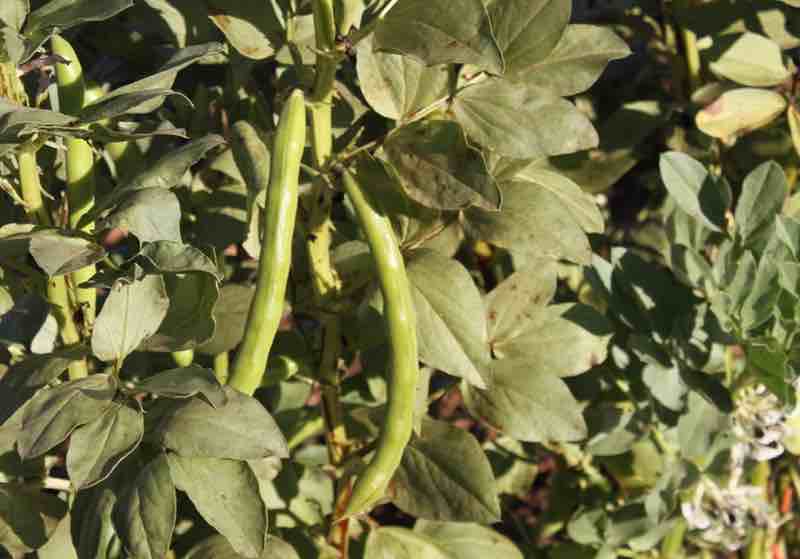 In all five blue zones they grow and enjoy broad beans.
In all five blue zones they grow and enjoy broad beans.My understanding is that it is the green beans and peas they enjoy, rather than those that have been dried; freshly-picked favas harvested straight from the garden whilst they are still young are quite different to those that have matured and been desiccated for consumption later.
Freezing green broad beans so that they can be enjoyed all year-round is not difficult.
Dried-beans have much higher levels of lectins compared with those those picked and enjoyed whilst still tender and green.
The plant-based food that blue zone people enjoy is low in refined carbohydrates; the researchers found they have only a moderate caloric intake. These folk eat whole-grains and sourdough bread but no white rice; they are consequently not obese. Yet they are not vegetarians.
Inoculating rhizobia onto the seeds of legumes greatly increases the yield; the bugs capture nitrogen from the atmosphere making it available to the plants for synthesising protein.
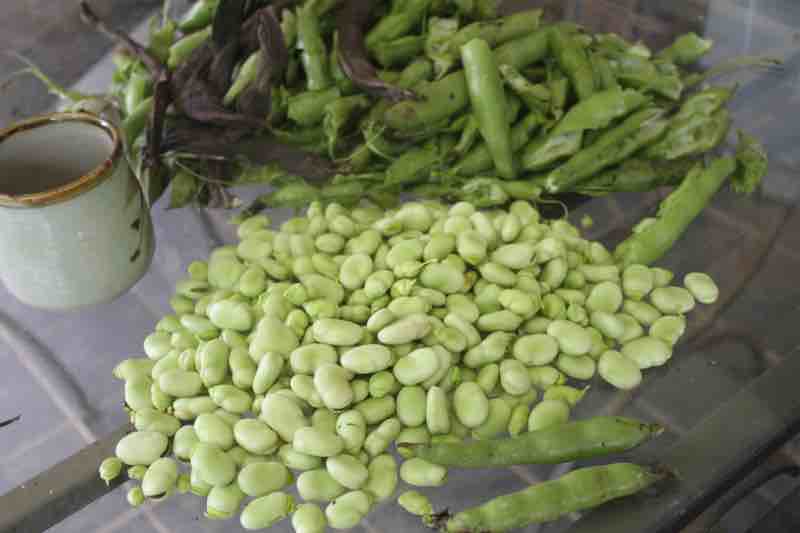 These beans came from just two plants.
These beans came from just two plants.Gardeners they found are less tense too, so there are mental as well as physical benefits; they take time to smell the roses.
They have lower levels of cortisol, the stress-hormone, when compared with those who sit inside and read a book, good though that is; what a pity that they did not include a third group who were watching TV.
"What if a walk in a green environment could reshape brains, recalibrate sense of time and stave off mental health conditions? If the research trends are true, doctors might soon find themselves writing prescriptions of 20 minutes of nature per day."
- Dr William Bird, MD, MBE
Join a gardening-club and start buying or selling produce at a local farmers’ market; these become social gatherings that give one a sense of connectedness.
Ask any gardener and they will tell you that the first thing they want to do in the morning is walk around the backyard; see what has happened overnight, pick a few flowers and some food for breakfast. It gives one a reason for living; ikigai in Okinawa. In fact, it is not that different to what is being called forest-bathing.
Family engagement, an active social-circle and the empowerment of women all come into the picture too. Blue zone living is not only about good food and plenty of outdoor exercise.
No smoking is obviously a common factor throughout Blue Zones but regular alcohol with meals is the norm, especially local unprocessed wine full of polyphenols. It is not considered a negative; except in Loma Linda where they are tea-teetotalers.
Could you start brewing your own wine or beer? Or even a mead if you have a beehive; as they do in Ikaria. Unpasteurised beverages like these are full of natural yeasts that contribute to the microbiome.
Nuts, turmeric and soy are other nutrients that are common to their diets.
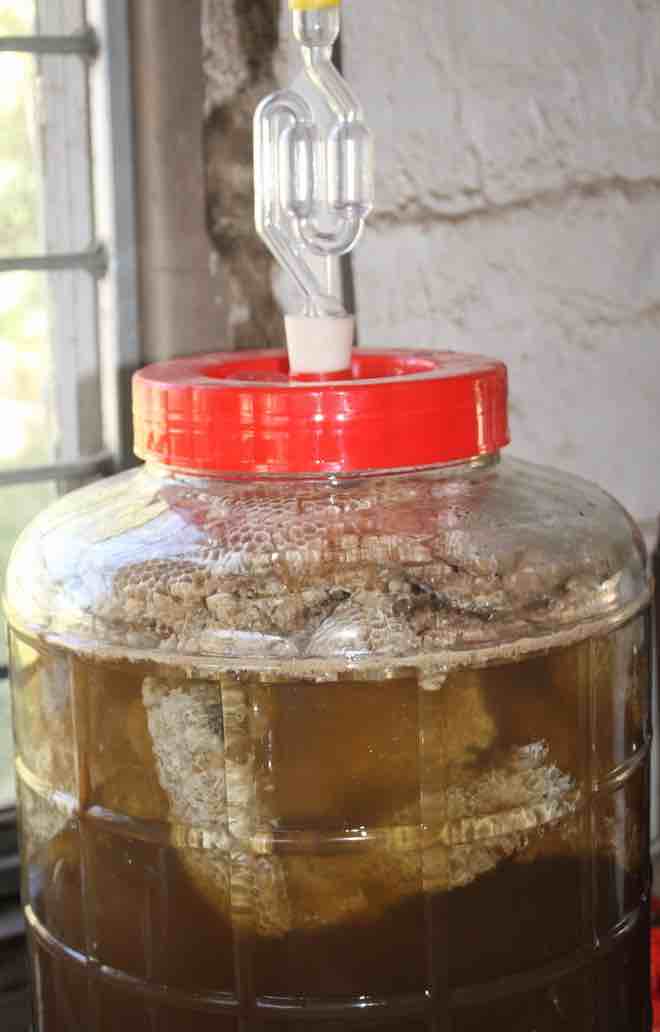 Home brews are full of natural yeasts.
Home brews are full of natural yeasts.Dark-green leafy vegetables
So just where should we start? Dark green-leafy vegetables and beans are specifically mentioned by researcher, Dan Buettner. I would recommend you begin with growing three rows of lettuce, spinach and kale. They have been documented as contributing to our well-being; and they are all easy, though more suited to cooler climes.
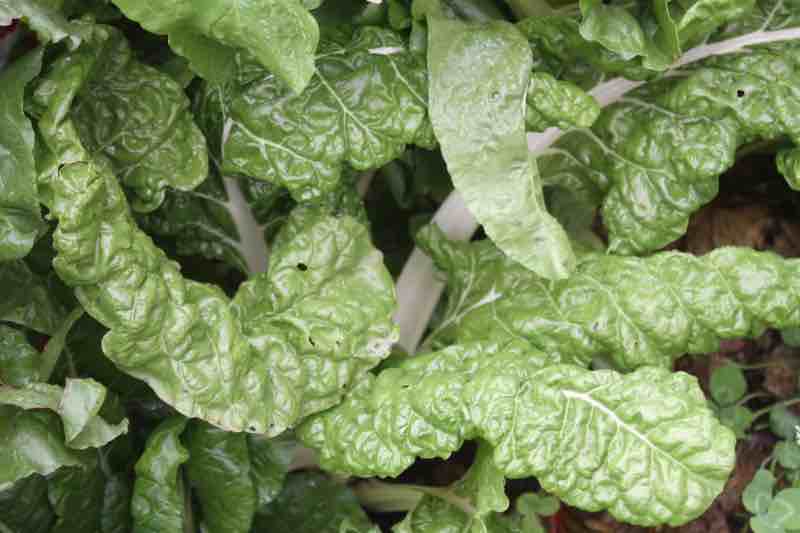
Food that is completely without blemish means that they probably have been sprayed with some toxic-ecocide. We should fear rather the things we cannot see, not those snails clearly visible to the naked eye.
Broad beans
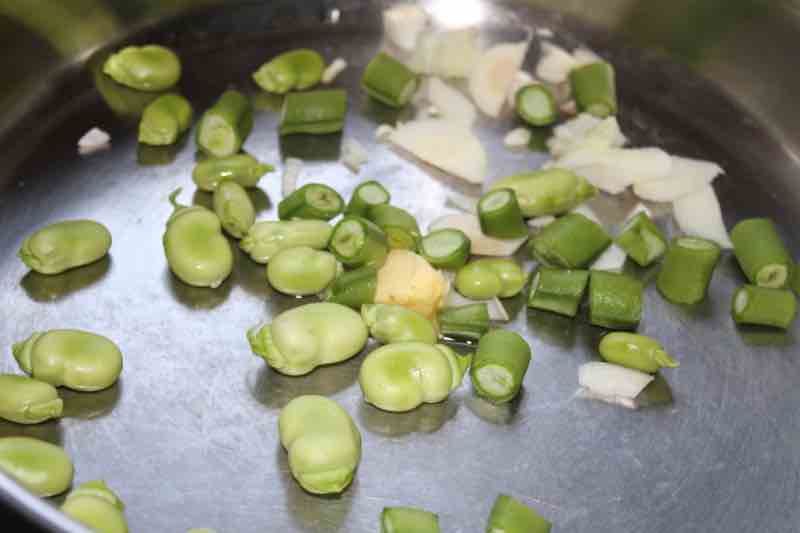 Young broad beans are the only source of L-Dopa.
Young broad beans are the only source of L-Dopa.Broad beans were specifically mentioned from the legume family, perhaps because they are the richest source of vegetable-protein after soyas; and the dopamines that are so important for our neurological systems. Gardeners have a 36 percent lower risk of getting dementia the researchers found; that is a massive contribution to blue zone longevity.
"There is increasing evidence that exposure to plants and green space and particularly to gardening, is beneficial to mental and physical health."
- Clinical Medicine (PMC6334070)[2]
But I would mark those favas, as they are commonly called, on the calendar for March which is late summer in South Africa; in Chicago we planted them in spring. There are many other green beans; the climbers are much the easiest. Witsa and limas are great favourites.
Your own fruit and veg is much more tasty, freshly-picked from the garden; you are more likely to enjoy all those colours that are so important if you can grow many of them yourself.
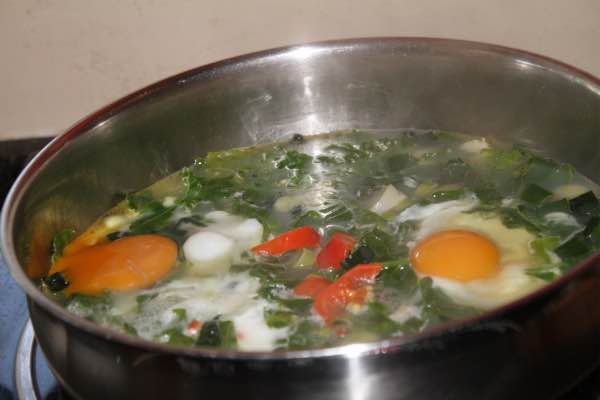
Longevity
Longevity is like a chair that, to stay in balance, attention must be given to all four legs says researcher Bradley Wilcox. Gardening can and should provide all of them.
- Better food
- Physical activity
- Mental engagement
- Social connectedness
Hippocrates the father of wellness, put it rather neatly. Let your food be your medicine. It is noteworthy that researchers keep finding that getting these nutrients from supplements has little beneficial effect on our cardiovascular systems and all-cause of death[1]. Blue Zone people provide many of them from their own gardens.
Buy some seeds and plants, and get started with your own Blue Zone; and take time to smell the roses. Relaxation is a key factor.
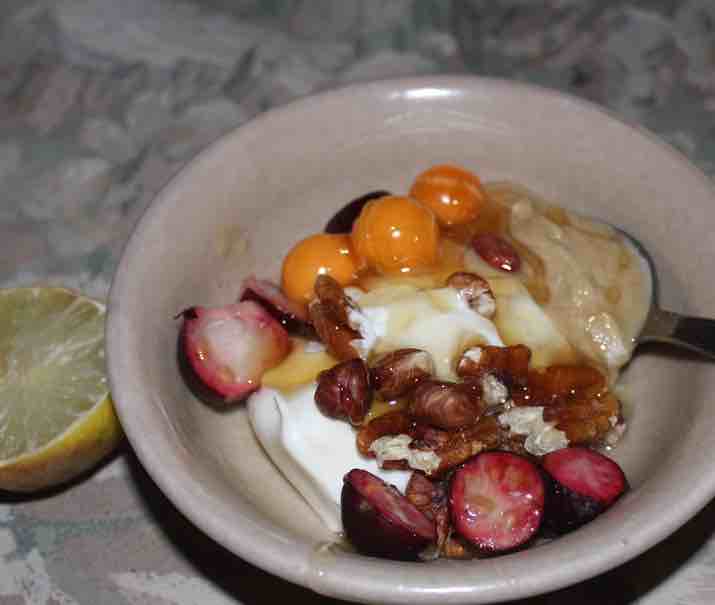
In all five blue zones the people eat a large breakfast, a lighter lunch and supper is the smallest-meal. Leaving the table slightly hungry is common to all the areas.
It is for this reason that we introduced eggs Hilton along with fruit and nuts to start the day; and stone ground grits.
Breakfast as royalty and dine like a pauper as the saying goes.
Thanks to BBC Worklife for the inspiration for this blog on blue zone longevity.
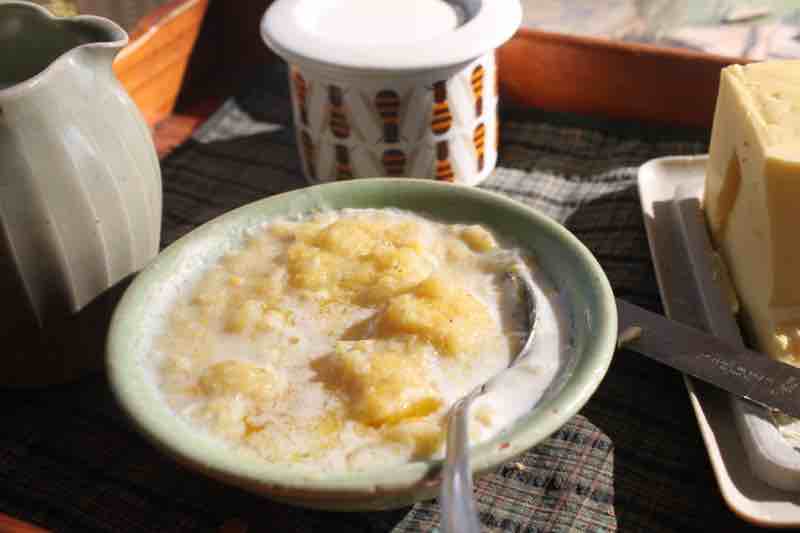
The pandemic
With Blue Zones having so many elderly people one could have expected that the virus would have swept through the towns; not so.
In
Okinawa for example, with a population of 140,000 people there have
been only 143 confirmed cases and 7 deaths in total; there has not been
one new infection in the last five-weeks as of 3rd June, 2020[4].
Likewise in Sardinia despite being in Italy, the country with the third-highest number of infections in the world; with a population of 1,6 million there have been only 1361 confirmed cases by 3rd June, 2020 with 131 deaths. Blue zone longevity stands strong in the face of the pandemic.
Family is strong
Strong local family ties is one of the reasons that the virus has not decimated the population of elderly folk living in the Blue Zones[5]. There are no old-age homes; work involving physical activity like gardening too.
The coronavirus is such a killer because it kick-starts the immune system in people with less than optimal wellness into a very dangerous overdrive known as a cytokine storm; a severe inflammatory response within the lungs especially but affecting all parts of the body. It is strongly associated with raised blood glucose and diabetes; and a deficiency of vitamin D.
There is a much lower prevalence of diabetes in Blue Zones[6].
Regular exposure to sunshine helps to prevent this it seems because in warmer weather Blue Zone folk spend more time out of doors; that would mean exercise lowering blood glucose too.
Food rich in vitamin D would help too, though it is not effective in the treatment of viral conditions unless deficient; humans need that sunlight for many reasons. Researchers conclude that prevention by keeping up high levels of this essential substance remains the best strategy.
Creating systems
It is interesting that Blue Zone people never go on diet, nor do they take part in exercise programmes. Instead natural systems have evolved where they grow their own food and at markets have access to fresh-fruit and vegetables at affordable prices. They dig in their gardens, walk and cycle to visit friends; they do their own shopping.
They have no need of restrictive food plans and gyms which lead to short-term gains but, because they are so insular and boring, in the long run fail; instead their energy would go into harvesting olives, brewing wine and keeping bees, for example.
Instead of a focus on the individual, successful interventions have created systems that naturally lead to more activity and better nutrition in the greater populace. That is huge in Blue Zone longevity.
For example in Finland, Dr Pekka Puska, the director general of Well-being, Welfare and Research introduced systems that led to an 80% drop in cardiovascular disease over a thirty year period, and 60 percent reduction of neoplasms[2].
Another profound thinker on the subject is Dr Clayton Dalton, MD, from the Massachusetts General Hospital who writes that America's chronic disease crisis is not inevitable[3].
Whole grains
Whole grains are difficult to get. A green mealie a day will help keep the doctor away but what could you do in the winter months?
Baking sourdough bread using wholemeal is the norm in all five Blue Zone countries.
This fried bulgur wheat with turmeric is simple and delicious.
Blue zone longevity
Blue zone longevity is associated with gardening, whole grains and connectedness to family; and the community. There are no old age homes. Moderate exercise, sourdough bread and growing broad-beans are independently part of their lives in all five areas.
Could you emulate these people who are focused on a very full and satisfying life, largely free from doctors and medication? They continue to view themselves merely as aging adolescents, forever young.
- Supplemental vitamins and minerals for CVD prevention and treatment
- Lessons from the Blue Zones
- America's Chronic Disease Crisis is Not Inevitable
- Latest updates on COVID-19 in Okinawa
- COVID-19 in the Blue Zones—What’s Helping Elders in Sardinia, Italy. Type this into the search engine.
- Clinical, functional, mental and social profile of the Nicoya Peninsula centenarians, Costa Rica, 2017
When browsing use right click and "Open Link in New Tab" or you may get a bad gateway signal.
Newsletter
Our newsletter is entitled "create a cyan zone" at your home, preserving both yourself and Mother Earth for future generations; and the family too, of course. We promise not to spam you with daily emails promoting various products. You may get an occasional nudge to buy one of my books.
Here are the back issues.
- Lifestyle and ideal body weight
- What are ultra-processed foods?
- Investing in long-term health
- Diseases from plastic exposure
- Intensive lifestyle management for obesity has limited value
- A world largely devoid of Parkinson's Disease
- The impact of friendly bacteria in the tum on the prevention of cancer
- There's a hole in the bucket
- Everyone is talking about weight loss drugs
- Pull the sweet tooth
- If you suffer from heartburn plant a susu
- Refined maize meal and stunting
- Should agriculture and industry get priority for water and electricity?
- Nature is calling
- Mill your own flour
- Bake your own sourdough bread
- Microplastics from our water
- Alternative types of water storage
- Wear your clothes out
- Comfort foods
- Create a bee-friendly environment
- Go to bed slightly hungry
- Keep bees
- Blue zone folk are religious
- Reduce plastic waste
- Family is important
- What can go in compost?
- Grow broad beans for longevity
- Harvest and store sunshine
- Blue zone exercise
- Harvest and store your rainwater
- Create a cyan zone at your home
When browsing use right click and "Open Link in New Tab", or you may get a bad gateway signal.
Did you find this page interesting? How about forwarding it to a friendly book or food junkie? Better still, a social media tick would help.
- Bernard Preston homepage
- What is a Cyan Zone?
- Blue Zone longevity
Address:
56 Groenekloof Rd,
Hilton, KZN
South Africa
Website:
https://www.bernard-preston.com